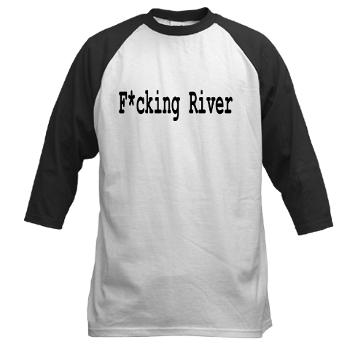Thursday, November 24, 2005
"Someone's got to take the fall... why not me?" -- R.E.M., Falls to Climb
Yup - I fall to climb alright. I've got quite a bit of climbing to do.
I headed up to the boats again tonight and met up with Baz and Maigrey. I ended the night with results similar to yesterday, sans all of the nuggets of wisdom. So, I'm going to need some help from you guys to glean some good out of this painful evening.
The two most costly lessons I learned at the 200-max NL table tonight:
1. Don't push with pocket Kings into pocket Aces.
2. Don't raise Baz all in with top two pair, AQ, after he has flopped a set of four's.
I'm going to elaborate on those two hands (which seem so self-explanatory), because I don't think I played them poorly. More likely, I think I ran into a combination of bad timing and bad luck.
Let me backtrack a bit. Last night, I did a whole lot of thinking about the concept of chip conservation. My no-limit game is a tournament game; one of last night's lessons was that in cash games, there is no goal of chip conservation. The goal is to get your chips into the pot in +EV situations. So, I started trying to think of situations that might be suitable for this goal.
Some possibilities:
- Two pair on an uncoordinated flop, or one that people might be drawing to. Kill the odds for those who are drawing, while still holding a chance to turn a strong hand into a monster (full house).
- Flopping a set.
- Hitting small/medium flushes. Get the big cards out who might be drawing to a higher 4-onboard flush.
1. I've got about $150 in my stack. I have KK in early position. I raise to $30. The table bully and huge chipleader raises to $75. I call and hope not to see any big cards on the flop. (I was primarily hoping not to see an ace.) The flop comes a bunch of ragged uncoordinated low cards. I push all in and he calls. Of course no Ace came on the flop; my opponent was holding two of them.
AA > KK
Rebuy!
2. I have AQ offsuit UTG+1. (WTF is with me and AQ UTG+1?? I've decided I HATE IT and may be folding it from now on. Your thoughts on that?) I limped along with most of the table. Nobody raised preflop. The flop came A-4-x, 2 spades (of which I held 1). I check-raised Baz all in (which really isn't as dramatic as it sounds - Baz and I had rebought at about the same time, and we each had barely more than $130 in front of us). Let's say there were 6 people to the flop (can't recall exactly, but it was a bunch) = $30 in the pot. Baz had bet out $50 at me on the flop, and I raised all in to $131 all day. I turned 2 pair but was dead on the river to Baz's set of four's.
Am I playing too fast here with top pair? I figured my Q kicker to be good in the absense of a preflop raise (ie. AK isn't o ut there), and wanted to push out any spade draws. I was honestly hoping to take the pot right there, thinking Baz was betting a smaller ace.
As I replay this hand in my head, it seems to me that my only moves were to either raise or fold, because calling Baz's bet not only gives me no information, but commits me to the pot blind. Unfortunately for me, my raise had to be all in, as I was short stacked.
So... bad timing for me. Honestly, I think I lost more money on the pots I didn't win. Let me explain.
Going back to the concept of chip conservation. I'm good at conserving chips. I'm good at being patient and waiting like a rock for premium hands and strong drawing hands. I am not, by nature, aggressive.
After last night's session, I saw quite clearly that I had to pay more attention not only to my betting amounts (bet appropriately to push out draws), but also to the act of betting in general (ie. DO IT and don't give away free cards). In other words, be aggressive.
The part that I failed to fully consider, though, was the part about rightfully calling. In an attempt not to go broke (again, that "chip conservation" mentality), I folded strong draws that I should have called. I had in my head that it's no good to call off large quantities of chips on draws in no-limit... but that's in no limit tournaments. I hope Maigrey (or any of you) will correct me if I'm wrong here, but I should be able to extend the same math I learned last night with calling raises with small/medium pocket pairs to other drawing situations, right?
Example:
I limp into a pot in middle position with Jack-Ten suited. I think there were 4 callers, for a pot of $20. The flop comes 8-9-A?, and I'm first to act. I've got the open ended straight draw, and there are no flush possibilities out there yet. I check, and a guy bets out $20. Another guy calls. Maigrey raises to $60, and it's back to me. There's $120 in the pot, and it's $60 to me. One guy has already counted his chips in his hand; I figure I can count him as a caller, and I don't think the other guy is going anywhere. But - I'll be conservative. Let's say the chip handler would call - putting $180 in the pot. I'm getting 3:1 on my money. (Even without him, 2:1 was probably enough to make the call, considering my implied odds to be great if I hit my draw to the nut straight). It was quite sick actually, because I knew I had the odds to call. I was just afraid to lose a chunk of chips on a draw.
*smack*smack*smack* with a sledge hammer. Dumb ass.
Maigrey took down the pot with two pair. The pot ended up being huge, and I would have hit my straight. Nice bet, Maigrey! I was too scared to cold-call $60, thinking that donking off a quarter of my stack on a draw was not a good idea.
The donkey move there, however, was NOT calling.
To test out some math here: my 8 outs twice was about 32% to hit by the river. Let's say I had $180 in front of me, and Maigrey had me covered. The most I could win from her would be, then, $180. Does that mean I could call a bet of up to $58 (or, 32% of $180) and still be profitable in the long run if I miss the draw? (Probably even a bit more if I count the money I'd get from the other caller or two). Damn it. I should have called six ways to Sunday. I suck.
On another hand, I ran into a similar situation. I have 8-6 clubs in the big blind for $5 (Ed's favorite hand). The button raises it to $15. With a handful of limpers already in the pot, I want to see a flop. Sure enough, we go to the flop with 5 people in for $15 each = $75. The flop brings 2 clubs, A-x-x. I check and hope to draw my non-nut flush cheaply. The woman to my left bets out $45. She's an oober-rock, to the tune of premium hands or painted blackjack hands only. She probably has a big Ace. Any-Two-Cards-Johnny to her left min-raises to $90. Action folds around to me. My brain goes, "How the hell are you going to cold-call NINETY DOLLARS on a freakin' DRAW??? A non-nut draw, at that??" I didn't even bother to count my odds and folded. Trying to conserve those chips, ya know.
Let's do the math right now, shall we? Let's assume the woman will call the raise. That puts 75+90+90 in the pot = $255. I'm getting almost 3:1 on my money for a non-nut flush draw. Let me try the math another way - please correct me if I'm wrong. There's $255 in the pot now, and if my flush is good, I figure to at least double through one of my opponents (another $100 or so). That's a total pot of $355. If I'm 35% to make my flush with 2 cards to come, and I assume my flush is good, I can call a bet of up to $124 or so.
Do I think that either one of them are on the flush draw? Honestly, no. But, if I hit the flush, all of my chips are going into that pot, and am I comfortable doing that with an 8 high flush?
The real question: am I comfortable enough trusting my read that neither one of my opponents had a big flush draw? Obviously not.
I folded.
It turns out that the woman had an ace (and ended up turning 2 pair), and Any-Two-Cards-Johnny had 5-2 of clubs. The third club hit on the river, and ATC-Johnny took the pot with his 5-high flush.
That's a lot of chips I just gave up, trying to conserve $90.
Would you have called the flop bet with the 8-high flush draw?
To conclude tonight's lesson: I lost a lot of chips in hands where I got unlucky, but I think I lost the most chips in hands where I failed to properly call with drawing hands that came through.
I guess this "chip conservation" thing can't be beat overnight. Maybe I'll try again this weekend.
Baz - I hope you were able to hang onto my chips, and take down ATC-Johnny and his buddy (the 10 seat). :) Maigrey - I hope your luck turned upwards. You looked to be in similar doldrums as I when I left.










When you did the math for your straight draw & flush draw hands, you're assuming your chance to make the hand by the river, and that's a mistake. It's a mistake, because there is likely to be more betting on the turn. As such, you need to be thinking in terms of making your hand on the next card (i.e. cut your chance to make the hand in half). Of course, if you do make your hand, you may well get all of your opponent's stack, so you do need to consider implied odds, but it's a mistake to be too agressive about counting your outs/figuring your chance to win.
Also, be careful about cold-calling those raises because you aren't closing the action. There's a chance the initial bettor will re-raise, so your pot odds will work out to be much worse than you were originally figuring.
Another thought which came to me, as I was reading the beginning of this post is that in live NL, people are much more likely to have the hands that they're representing. So when you bet TPTK and someone raises you, you generally don't want to push right then and there. Of course, you still might wind up going broke, but switching into defensive mode can often prove less costly when you're up against a superior hand.
Oh, and losing with K-K against A-A? You're probably going to lose all your chips there no matter what. You're supposed to lose there, after all, and just have to hope to get a chance to make up for it some time when YOU have A-A.
Also, getting busted by Baz's set of 4's is another situation where you're pretty much doomed to lose all your chips, which is why DoubleAs likes to observe that in NL, sets are gold.
ALSO - implied odds are important. Flushes and straights are hard to get paid for against good players because they SEE them on the board. I don't know that with three people in the hand that I'm going to pay much money when a Q comes down as there's a good possibiity AQ is the initial bettor, and the 7 puts an EASY straight out there. So there you go. With the initial raiser in the pot, I'm pretty sure he's not on the draw, so I can bet.
This is why sets are gold -it's so hard for anyone to SEE them.
2.) You made a good play with the KK - you just called, looked at the flop, and when thre was no A, you bet it. A lot of people push preflop which is the wrong move IMO. You could have also gotten away from the hand if an A came down.
3.) The set of 4s: Here's the important note: Let's say there were 6 people to the flop (can't recall exactly, but it was a bunch) = $30 in the pot. Baz had bet out $50 at me on the flop [...]
What needs to go through your head is "WTF?!?! Baz is a not a stupid player, what is he OVER BETTING the pot with?" That overbet should set off bells and whistles in your head; and I would have outright asked him if he had AK, or Ax of spades. You have $5 in the pot, and generally an over bet is someone who thinks they have the nuts now, but doesn't like the draw that's out there (in this case the flush). You need to lay this one down unless you have a redraw. Pick a better spot to win your money.
Plus? People do limp in with AK, more than you might think - I do it ALL THE TIME because it's not really that great of a hand.
3. You have to remember that when you OVERCALL, your hand or draw needs to be THAT MUCH BETTER because your odds assume you can beat ALL OTHER opponents. Are you certain your flush/straight would beat everyone out there? The 3:1 odds etc etc are really only valid when you're looking heads up. Also, you could call the a bet, if you're going to be closing the betting - that's why position is SO IMPORTANT.
I would have folded the 86c.
As for the set.....no way you could see it.....I was hoping any two card Johnny would call but when he folded and you pushed I knew you had Ace big and figured you for possible spades as well so when the third spade hit I thought those chips were heading your way.
As far as AK goes......I'm probably about 50/50 with them as far as limping or raising.....my position has a lot to do with it but I don't ALWAYS raise in late and ALWAYS limp in early etc......it was actually an AK hand after you left that really pushed me over the tilt edge in regards to atc-johnny......hopefully I'll write it up and get some input here before long.
Hope to see you at the tables again soon......I'm not heading there tonight.....my wife wants to play Blackjack so we're getting a sitter and heading to Joliet Saturday night.....we'll see how it goes. Good Luck.